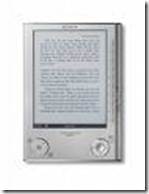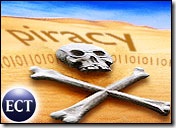eBooks have been a hot topic this week. Much news about the Sony change in strategy and what it means for the Kindle. I have had a hard time getting this piece together. . . for some reason (probably the heat), I am having a difficult time thinking, much less getting inspired or passionate. But here goes. . .
The Sony eBook Reader now reads Adobe Digital editions eBooks!
Last week Sony announced a new way of thinking. It came in the form of a software (firmware) release. In what appears to be a direct challenge to the Amazon Kindle, Sony opened up the Sony eBook Reader so that their owners can buy from other retail outlets.
Until now, the only way to read a copy protected (DRM) eBook on the Sony was to buy a book in the Sony store.  Not true anymore. The latest update allows the Sony reader to handled protected Adobe files and any of the ePub formatted files.
Not true anymore. The latest update allows the Sony reader to handled protected Adobe files and any of the ePub formatted files.
For those who wonder, the ePub format is the new standard proposed by the International Digital Publishing Forum. The IDPF has spent a lot of time developing this "universal" standard as a way to eliminate the confusion caused by many proprietary formats.
I am thrilled that to be able to welcome Sony eBook owners to the eBooks About Everything store!
A few words about DRM
In the beginning, Sony and Amazon created their eBooks with proprietary reading software. If you owned a Sony you could only buy books from Sony. If you own a Kindle you can only buy a book from Amazon.
The lack of a standard eBook format has been even more hampered by the way publishers think about copy protection and their decision to use Digital Right Management.
Make no mistake, I am NOT a fan of DRM, but as a bookseller I am more or less forced into selling DRM protected books. The publishers insist that it will protect their intellectual property and prevent piracy. SO if I want to sell the latest titles from the big publishers like Random House, Simon & Schuster or Harper Collins I have no choice.
Most books in the eBooks About Everything store are offered in four formats -- adobe digital editions, palm eReader, MSReader and Mobipocket. Very cumbersome!
At least 95% of our customer support issues are related to DRM! That is a lot of time and energy.
 As much as it might pain me, I agree with Bill Gates about piracy. It is inevitable and probably helps more than hurts:
As much as it might pain me, I agree with Bill Gates about piracy. It is inevitable and probably helps more than hurts:
"And as long as they're going to steal it, we want them to steal ours. They'll get sort of addicted, and then we'll somehow figure out how to collect sometime in the next decade. . . They'll get addicted and we will collect."
The music industry has finally given in; it will be interesting to see how long the publishing industry holds out.
The New York Times and Literacy in the Digital Age
The Sunday edition of the New York Times has an excellent piece on literacy in the Digital Age: Literacy Debate: R U Really Reading.
This is an excellent piece on the pros and cons of digital reading and the largely generational divide in attitudes about literacy and online reading. Highly recommended!


 Irony is my most favorite form of humor! And last week Amazon provided me with a great "laugh out loud" funny moment.
Irony is my most favorite form of humor! And last week Amazon provided me with a great "laugh out loud" funny moment.





 A friend sent me a link to some wonderful book pictures taken by
A friend sent me a link to some wonderful book pictures taken by 



